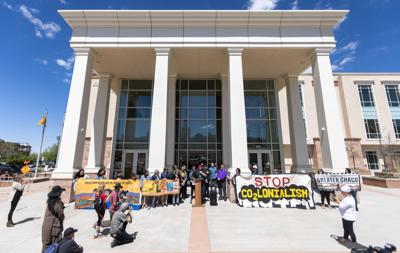
High Court Agrees to Review Landmark Environmental Lawsuit
The New Mexico Supreme Court has agreed to hear a case that accuses the state of failing to protect residents from oil and gas pollution.
The lawsuit, filed two years ago by Indigenous, youth, and environmental organizations, argues that the state has not met its constitutional duty to safeguard public health and natural resources from industrial contamination.
Earlier this year, the New Mexico Court of Appeals dismissed the case, ruling that it did not meet the legal standard for enforcement. However, the state’s highest court voted to take it up—reviving what could become one of the most consequential environmental law cases in state history.
Pollution Control Clause at the Center of the Debate
1971 Amendment Mandated Legislative Action
At the heart of the case is the Pollution Control Clause of the New Mexico Constitution, approved by voters in 1971. The clause requires the state legislature to enact and enforce pollution controls to protect the environment “to the maximum benefit of the people.”
Environmental advocates say the state has failed to uphold that responsibility, despite record levels of oil and gas production. New Mexico ranks second in the nation for crude oil output, driven largely by drilling in the Permian Basin, where flaring and methane leaks have raised widespread environmental concerns.
Advocates Call for Stronger Oversight
Supporters of the case argue the clause was intended to give citizens a constitutional guarantee of environmental protection—not just policy discretion.
“This provision is intended to safeguard us from industry pollution, and I’m hopeful the state’s highest court will affirm these protections for every New Mexican’s well-being and our state’s future,” said an attorney for the Center for Biological Diversity, one of the plaintiffs.
Potential Implications for Oil and Gas Regulation
Decision Could Set National Precedent
Legal analysts note that if the Supreme Court sides with the plaintiffs, it could force the state legislature to pass stronger environmental regulations or tighten enforcement of existing rules governing oil and gas operations.
The case also carries implications for state sovereignty and environmental justice, as communities near oil fields—particularly Indigenous and rural populations—face increased exposure to air and water contamination.
Energy industry representatives have expressed concern that an unfavorable ruling could lead to higher regulatory costs and permit delays for operators across the region.
Broader Context: Energy vs. Environment
Balancing Economic Growth and Public Health
New Mexico’s oil and gas sector remains central to its economy, generating billions in annual tax revenue. Yet, advocates argue economic reliance should not outweigh public health.
If the court rules in favor of the plaintiffs, it could reshape the balance between energy development and environmental protection—not only in New Mexico but across other energy-producing states that enshrine similar constitutional protections.
Click here for Santa Fe New Mexican

